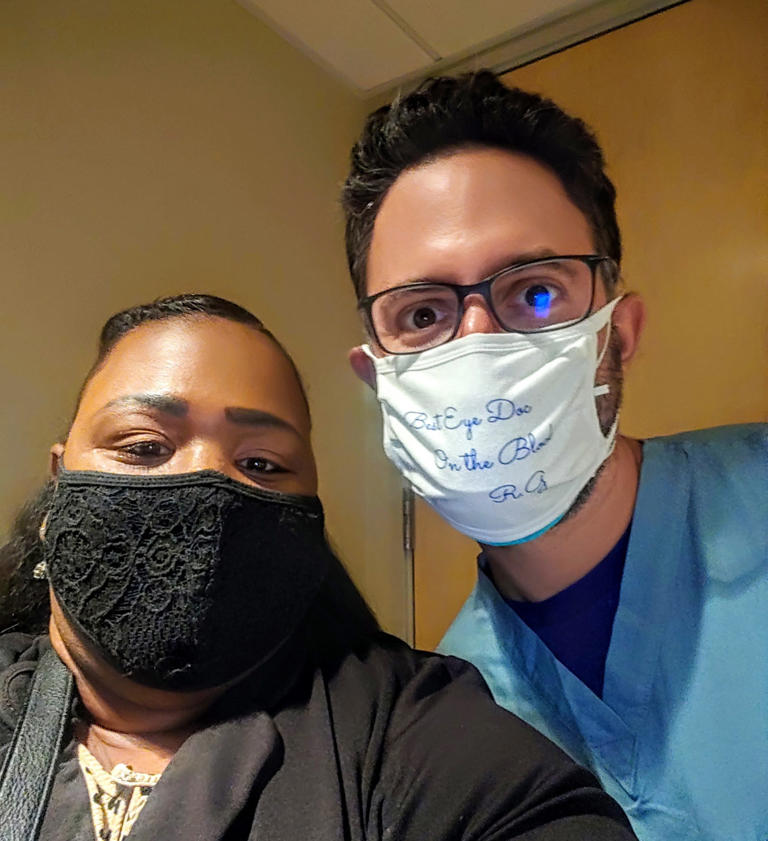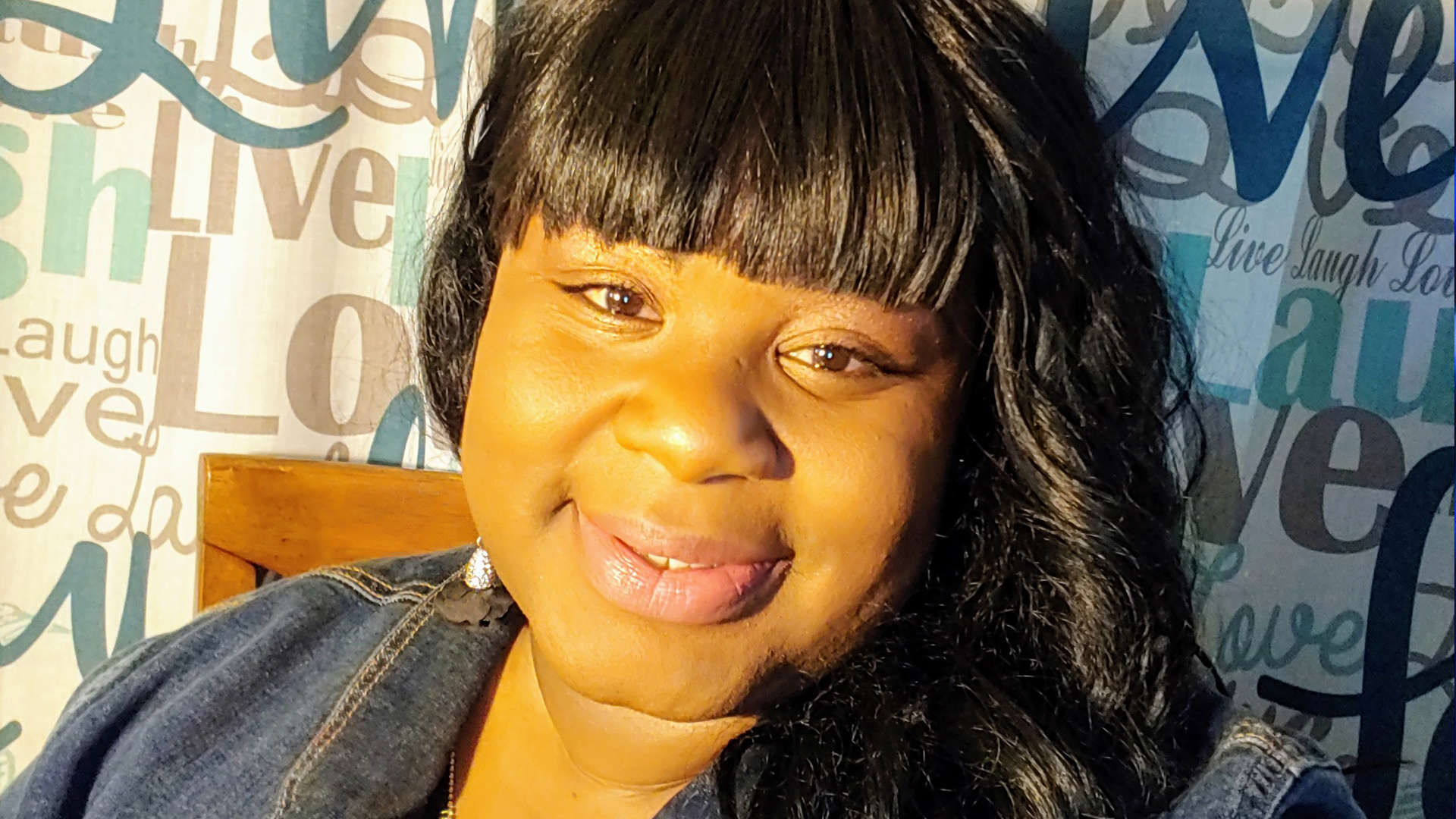According to the U.S. Office of Minority Health, about 1 in 10 Americans have diabetes and approximately 90-95% of them have type 2 diabetes. In the U.S., Black adults are nearly twice as likely as white adults to develop type 2 diabetes and are more likely to experience complications – a disparity that has been on the rise for nearly three decades.
One such real-life example is Lauren Smith. At just 38 years old, she lost nearly all of her vision due to complications from diabetes. Worried her doctors might judge how she was managing her diabetes, she waited to see an eye doctor for years. She was eventually diagnosed with diabetic macular edema (DME), a common diabetes complication and one of the leading causes of blindness in adults. African Americans are also 3x more likely than their white counterparts to develop DME.
Following four eye surgeries, Lauren was devastated that she may never be able to see again. But recently, thanks to an injectable treatment, she has regained most of her vision.
She still faces some daily challenges, including looking at her computer screen at work but wants to share her story to help others like her understand that it’s important to visit your eye doctor regularly to identify issues early on.
We had a chance to speak to her about her journey, and how she turned a tragedy into a testimony.
Tell us about yourself. Who are you? What do you do?
I’m 40 years old and work in finance in San Francisco. I began my career as a cosmetologist and owned my own business, but eventually moved into finance after a career change where I have been for the last decade.
For fun, I like to volunteer, particularly for special events like the Napa Valley Film Festival. I also like to go out with my friends, but have been more of a homebody this year!
You lost your vision due to a diabetes complication. What happened?
I was 37 when I was diagnosed with diabetes. I started losing peripheral vision in my left eye first due to diabetic retinopathy and that’s when I had to have my first major, invasive surgery to reattach my retina in April 2020.
While I was recovering from that, I was doing well then two to three months later, my right eye started becoming cloudy. I went to see my retina specialist, Dr. Roger Goldberg. When I went in for the eye test, I could not see anything out of my right eye and completely lost my vision. I needed to have my retina reattached.

It was very difficult for me because my job isn’t one where I can’t see. When I process checks I have to pull labels and insert checks – which is a lot of hand-eye coordination. I was feeling hopeful after my first surgery, but when my right eye had issues I felt like “what am I doing wrong?” I was a little bit depressed but I knew that I was in good hands with Dr. Goldberg. I had my second invasive surgery in my right eye in November 2020. In total, I had four laser eye surgeries – two in each eye — which were all a result of my diabetic retinopathy.
I’m happy to say it’s been successful so far for me, and my sight is back to nearly 100%. I haven’t had any setbacks or allergic reactions and my vision feels more stable each time I get injections. There are days when my vision is a little bit strained because I have to work with computers all day. Other than that, my vision is really good. I’m grateful there are treatments like Lucentis that are helping people to restore their vision. It’s been amazing that I have been able to get that sight back!
What do you wish you knew about diabetes back then, that you currently know now?
I didn’t know the severity of what diabetes could do, especially with the eyes. I was young when my father was diagnosed, and his brother died of a diabetic coma so it was hard for me to comprehend it at the time. I wish I knew to take better care of myself early on. Now, I know I can’t take things for granted.
Dr. Goldberg set me on the right path. It took a lot of work to get my weight and blood pressure in a good place, but when you start to lose your vision it hits a little closer to home.
What are some of the warning signs women – especially Black women – should look out for when thinking about diabetes complications?
In my personal experience, my vision started to get blurry and at one point I could see blood in my eye. Like many other people with diabetic retinopathy, I developed what they call “floaters” or spots you can see in your eye. Those were my first warning signs, which aren’t uncommon for others. It was then that my primary care doctor referred me to Dr. Goldberg whom I’ve been seeing ever since.
How can some of these things be prevented?
The most important piece of advice I would give is to get your eyes checked regularly and understand the risks of diabetes on your eye health. Don’t put it off. If your vision starts to become blurry at all or you’re concerned for any reason about your eye health, see your doctor right away and make sure you talk to them about available treatment options.
Finally, can you give us some advice about how you managed to overcome the setback this malady provided?
I overcame my diagnosis with family support, a lot of prayers, and my belief in God. My family helped me stay on track. I’ve also had many support groups to help me keep my diabetes in check, and work has helped to keep my mind active and busy.
Exercise has also helped which I do every day. I do a lot of walking when I can at lunchtime or during my breaks at work. I drink a lot of water during the day. I cut out caffeine. I try to keep a positive attitude about things. During the day I’m so busy and can get a negative feeling when I’m bogged down with stuff, but I try to stay positive and keep going, especially with everything going on.
Take the time to take care of yourself and go to the doctor. A lot of people right now don’t feel like they need to prioritize taking care of themselves. They wait until the last minute to check up on themselves. I had a problem with going to the doctor. Going to the hospital always meant something was very wrong and going to end badly for me. A lot of people don’t realize how much they need to check on themselves and make sure that they’re healthy. Even if they do feel healthy there might be something that’s an underlying thing so regular check-ups to the doctor are important.
